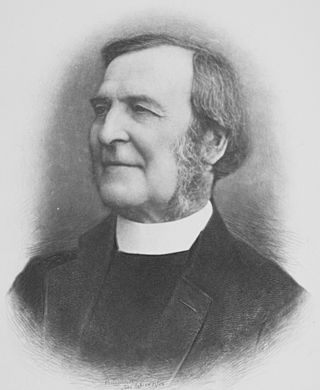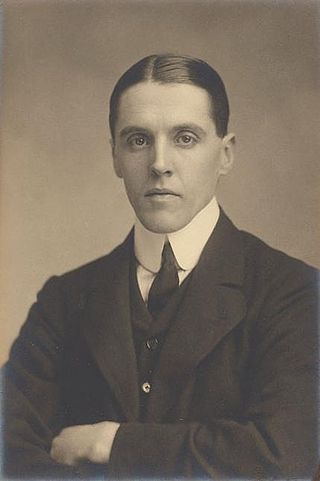Related Research Articles

Karl Marx was a German-born philosopher, political theorist, economist, historian, sociologist, journalist, and revolutionary socialist. His best-known works are the 1848 pamphlet The Communist Manifesto and his three-volume Das Kapital (1867–1894); the latter employs his critical approach of historical materialism in an analysis of capitalism, in the culmination of his intellectual endeavours. Marx's ideas and their subsequent development, collectively known as Marxism, have had enormous influence on modern intellectual, economic and political history.

Frederick Temple was an English academic, teacher and churchman, who served as Bishop of Exeter (1869–1885), Bishop of London (1885–1896) and Archbishop of Canterbury (1896–1902).

Salmon Portland Chase was an American politician and jurist who served as the sixth chief justice of the United States from 1864 to his death in 1873. Chase served as the 23rd governor of Ohio from 1856 to 1860, represented Ohio in the United States Senate from 1849 to 1855 and again in 1861, and served as the 25th United States Secretary of the Treasury from 1861 to 1864 during the administration of Abraham Lincoln. Chase is therefore one of the few American politicians who have served in the highest levels of all three branches of the federal government, in addition to serving in the highest state-level office. Prior to his Supreme Court appointment, Chase was widely seen as a potential president.

Thomas Johnson was an 18th-century American lawyer, politician, and patriot. He was a delegate to the First Continental Congress in 1774, where he signed the Continental Association; commander of the Maryland militia in 1776; and elected first (non-Colonial) governor of Maryland in 1777. Throughout his career, Johnson maintained a personal and political friendship with George Washington, who gave him a recess appointment as an associate justice of the Supreme Court in August 1791. He served only briefly, resigning in January 1793, citing poor health.

Frederick Edwin Smith, 1st Earl of Birkenhead, was a British Conservative politician and barrister who attained high office in the early 20th century, in particular as Lord High Chancellor of Great Britain. He was a skilled orator, noted for his staunch opposition to Irish nationalism, his wit, pugnacious views, and hard living and drinking. He is perhaps best remembered today as Winston Churchill's greatest personal and political friend until Birkenhead's death aged 58 from pneumonia caused by cirrhosis of the liver.

Admiral Sir Hugh Francis Paget Sinclair,, known as Quex Sinclair, was a British intelligence officer. He was Director of British Naval Intelligence between 1919 and 1921, and he subsequently helped to set up the Secret Intelligence Service and GCHQ.

Oxford University Cricket Club (OUCC), which represents the University of Oxford, had held first-class status since 1827 when it made its debut in the inaugural University Match between OUCC and Cambridge University Cricket Club (CUCC). Following the 2021 University Match, OUCC lost its first-class status. It was classified as a List A team in 1973 only. Home fixtures are played at the University Parks slightly northeast of Oxford city centre.

William Johnson Fox was an English Unitarian minister, politician, and political orator.

Arthur Frederick Jeffreys was an English first-class cricketer and Conservative politician. He served as the Member of Parliament for Basingstoke from 1887 until his death in 1906. As a cricketer, he made 26 appearances in first-class cricket, mostly for the Marylebone Cricket Club, though he also played for Hampshire and in Australia for New South Wales.
John St John Frederick was an English first-class cricketer, cricket administrator, and British Army officer.
John Norman Bateman-Champain was a first-class English cricketer, making five appearances, who later in life became the third Anglican Bishop suffragan of Knaresborough. Bateman-Champain was a right-handed batsman.
The Magdalen Ground was a cricket ground in Oxford, England. The ground was owned by the University of Oxford and used by Magdalen College, a constituent college of the University of Oxford. Originally forming the northern point of Cowley Marsh, the ground was initially associated with the Magdalen College School, whose students played cricket there. By 1829, the Oxford University Cricket Club had been given a part of the marsh where the College School played cricket. In 1851, it was purchased at auction by the University of Oxford and leased to the University Cricket Club. The ground operated as a first-class cricket venue from 1829 to 1880, hosting 69 first-class matches. The University Cricket Club left the ground following the 1880 season to play at the University Parks from 1881.

Bullingdon Green was a cricket ground south of Oxford, England. It was associated with the Bullingdon Club and was an important site in the early history of cricket in Oxford. The ground operated as a first-class cricket venue in 1843, hosting two first-class matches. It was subsequently built on in 1876 with the Cowley Barracks.

Manchester has historically influenced political and social thinking in Britain and been a hotbed for new, radical thinking, particularly during the Industrial Revolution.
George Henry Sacheverell Johnson FRS was a British clergyman and academic who was Dean of Wells and a professor at the University of Oxford.

The 71st Boat Race took place on 28 March 1914. Held annually, the Boat Race is a side-by-side rowing race between crews from the Universities of Oxford and Cambridge along the River Thames. Oxford went into the race as reigning champions, having won the previous year's race. In this year's race, umpired by former rower Frederick I. Pitman, Cambridge won by 4+1⁄2 lengths in a time of 20 minutes 23 seconds. The victory took the overall record to 39–31 in Oxford's favour. It would be the last race for six years following the outbreak of the First World War.

The Douglass family is a prominent American family originating from Cordova, Maryland, United States. It was founded by the politician and activist Frederick Douglass.
Frederick Crowder was an English first-class cricketer and tennis player.
Frederick Morton Eden was an English first-class cricketer and barrister.
Frederick William Garnett was an English first-class cricketer.
References
- ↑ "Frederick Johnson". ESPN Cricinfo. Retrieved 13 March 2017.